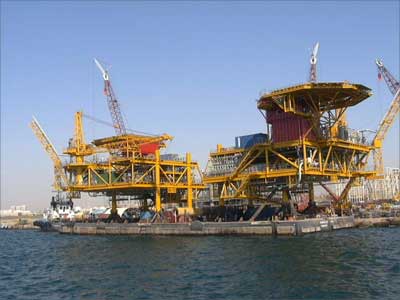 ONGC Videsh Limited (OVL), the foreign arm of government-owned Oil and Natural Gas Corporation (ONGC), is likely to raise about $900 million through a bond issue abroad in January 2013.
ONGC Videsh Limited (OVL), the foreign arm of government-owned Oil and Natural Gas Corporation (ONGC), is likely to raise about $900 million through a bond issue abroad in January 2013. The bond issue, the company's first abroad, is aimed at testing the foreign money market. OVL, which has drawn up a huge capital expenditure plan, has largely been dependent on its parent company for funding acquisitions.
ONGC has hired Citigroup , RBS and Standard Chartered to rate the bond issue. Proceeds from the issue would be used to fund the acquisition of stake in the Azerbaijan oilfields.
Of the $900 million the company plans to raise, $750 million can be borrowed under the automatic approval route. However, for the remaining amount, the company would have to seek the Reserve Bank of India's approval.
OVL would acquire Hess Corp's assets in a deal it expects to close in the first quarter of 2013.
The deal was subject to regulatory approvals, it had said. "Currently, borrowing in dollars is available at a cheaper rate. Our purchase of assets is in dollars and in our balance sheet, assets and liabilities are shown in dollars," said OVL Managing Director D K Saraf.
In September, Hess Corp had said it had agreed to sell 2.72 per cent of its stake in the large Azeri, Chirag and Guneshli (ACG) group of oilfields, as well as 2.36 per cent stake in an associated pipeline, to ONGC for $1 billion.
In 2009, too, OVL had raised debt when it bought Imperial Energy in a deal worth £1.4 billion ($2.22 billion).
A senior OVL executive said though the company had the comfort of ONGC providing funds to it, it would have to increasingly depend on other financing options to fund its acquisition plans.
Earlier this month, ONGC Director (finance) A K Banerjee had said, "To fund this year's capex of Rs 33,577 crore, the company will have to dip into its cash surplus. The surplus stood at Rs 12,000 crore in the beginning of the financial year, but it may come down to about Rs 4,000 crore by the year-end."
In October, Bharat Petroleum Corporation, one of the three government-controlled oil marketing companies, had debuted in the foreign bond market, with its issue being oversubscribed 15 times at a competitive coupon rate of 4.62 per cent.
Since 2010, IndianOil has carried out three bond issues. While its latest such issue was denominated in Singapore dollars, its issue denominated in US dollars last year had a coupon rate of 5.62 per cent.
Government-controlled oil companies, especially oil marketing companies, have been a major concern for rating agencies, owing to their mounting subsidy burden.
However, after the rise of Rs 5 a litre in diesel prices and the cap on subsidised domestic liquefied petroleum gas cylinders in September, the market perception has improved.










